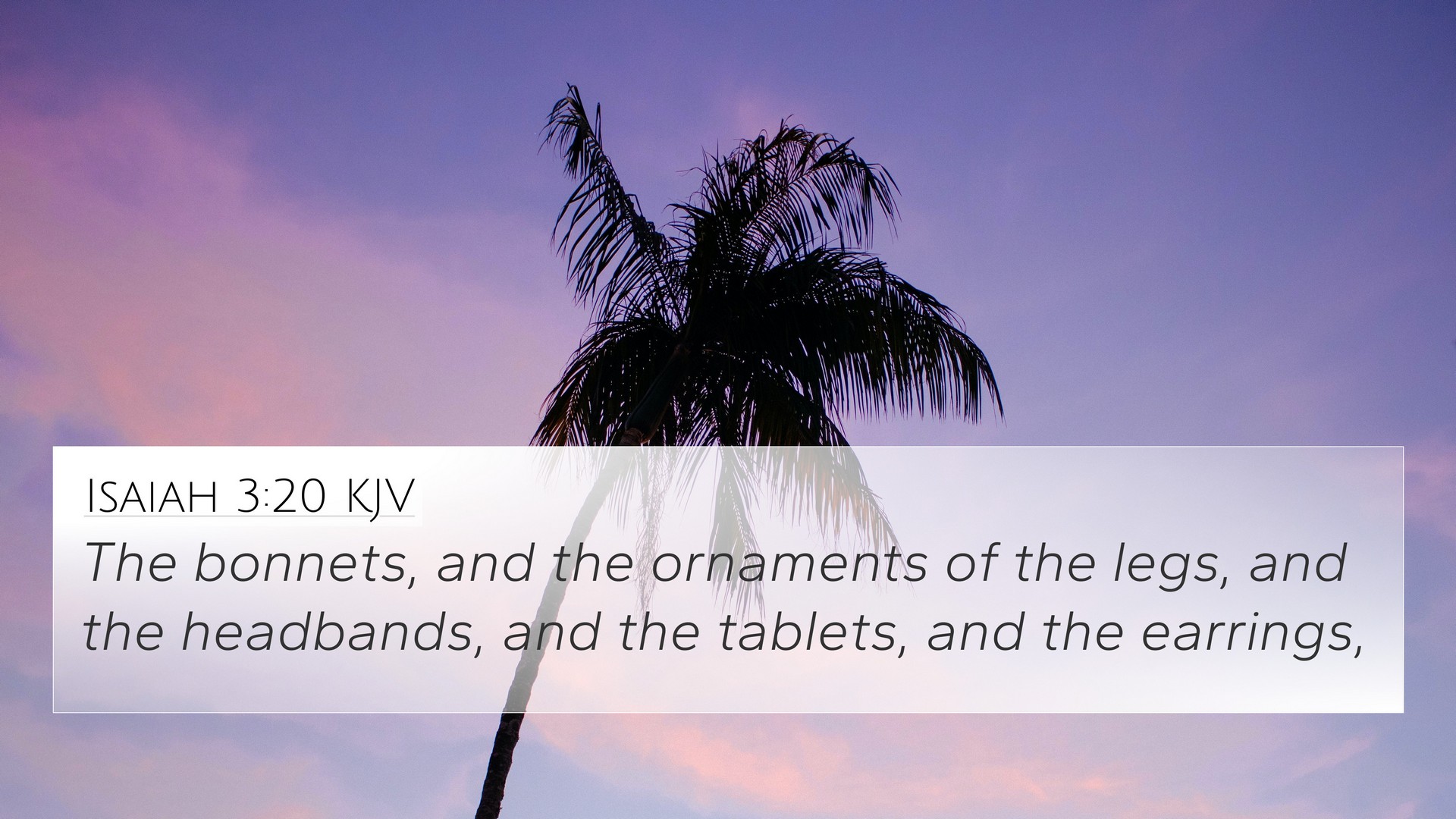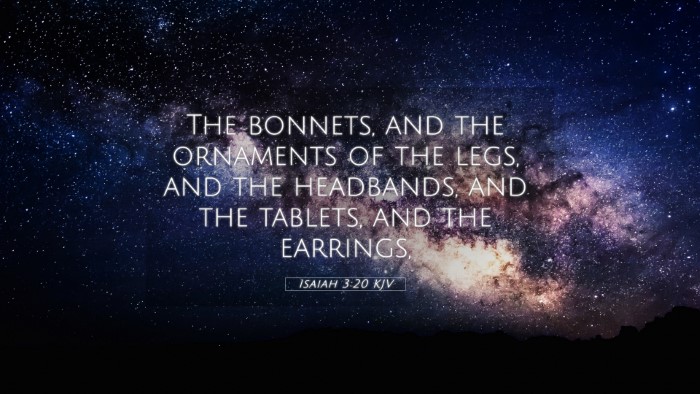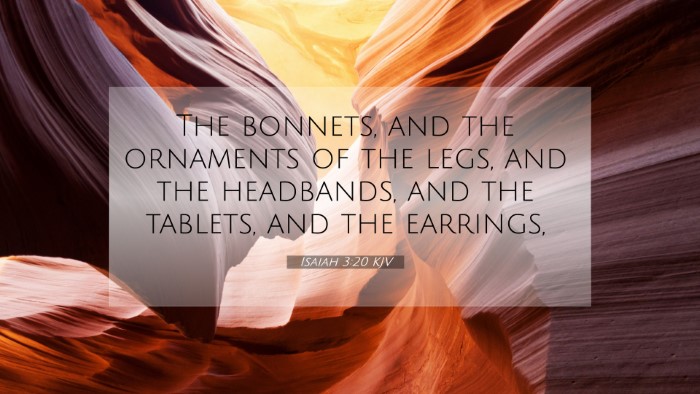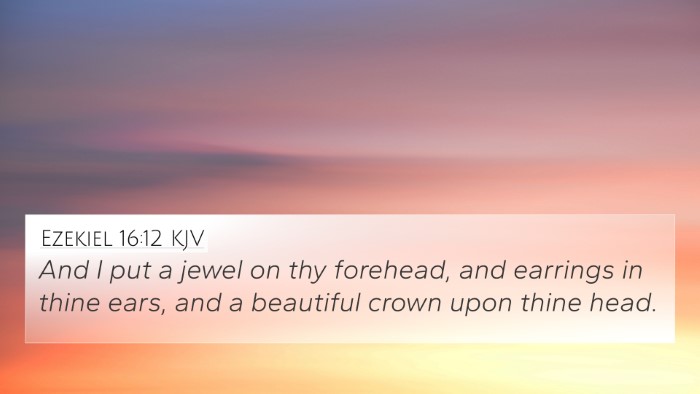Understanding Isaiah 3:20
Isaiah 3:20 states: "The bonnets, and the ornaments of the legs, and the headbands, and the tablets, and the earrings." This verse is part of a broader passage where God, through the prophet Isaiah, addresses the pride and vanity of the women of Jerusalem, warning about the impending judgment that their excessive adornment and superficiality would bring upon them.
Here we explore the implications of this verse using insights from public domain commentaries, such as those by Matthew Henry, Albert Barnes, and Adam Clarke, to provide a comprehensive understanding and thematic connections with other scriptures.
Key Themes in Isaiah 3:20
- Condemnation of Vanity: This verse highlights the excessive focus on external beauty rather than inner virtues.
- Judgment on Israel: It reflects God's displeasure towards a society that prioritizes ornamentation over righteousness.
- Symbolism of Adornment: The items mentioned symbolize societal values and priorities that are misaligned with God's will.
- Contrast with True Beauty: Throughout the scriptures, true beauty is often depicted as a heart aligned with God, contrasting sharply with the emphasis on physical appearance.
Commentary Insights
Matthew Henry: Henry explains that this verse illustrates the superficiality of the women of Jerusalem. Their adornments, which had become symbols of pride, would not protect them from judgment. He emphasizes the need for inner beauty and fear of God, suggesting that true elegance is found in humility and godliness rather than external decorations.
Albert Barnes: Barnes interprets the list of ornaments as pointing out the excessive and extravagant lifestyle of the women in Jerusalem. He notes that such emphasis on externals exposes a deeper spiritual problem: the lack of reliance on God. In judgment, these ornaments will not serve as a shield, but rather, the focus on them will lead to their downfall.
Adam Clarke: Clarke expands on the various items listed, explaining their cultural significance at the time and how they reflect the priorities of a materialistic society. He reinforces the message that God desires authenticity and integrity rather than mere outward show, highlighting the need for repentance and return to God's demands.
Cross-References Related to Isaiah 3:20
- 1 Peter 3:3-4: Encourages women to focus on inner beauty rather than external adornments.
- 1 Timothy 2:9-10: States that women should adorn themselves with good works rather than costly attire.
- Proverbs 31:30: "Charm is deceitful and beauty is vain, but a woman who fears the Lord is to be praised."
- Isaiah 3:16-24: Provides context for judgment upon the women in Jerusalem and elaborates on their vanity.
- James 4:4: Discusses friendship with the world as enmity with God, reiterating the need for spiritual alignment.
- Jeremiah 4:30: Similarly critiques the adornment as a false hope amidst impending judgment.
- Matthew 6:19-21: Advises believers not to lay up treasures on earth, emphasizing the importance of spiritual riches.
- Isaiah 1:17: Highlights the call to seek justice and care for the oppressed rather than being consumed by vanity.
- Ezekiel 16:30-31: Describes the unfaithfulness of Israel, likening their idolatry to promiscuity.
- Luke 16:15: Affirms that God values the heart over outward appearances.
The Importance of Cross-Referencing
Cross-referencing Biblical texts allows for a deeper understanding of scripture. Tools such as a Bible Concordance or a cross-reference guide can facilitate studies, highlighting thematic Bible verse connections and supporting a more comprehensive interpretation of verses like Isaiah 3:20.
By identifying connections between Old and New Testament teachings, believers can enhance their understanding of concepts such as vanity, judgment, and true beauty. Methods of cross-referencing encourage readers to explore scripture collaboratively, revealing a cohesive narrative of God's expectations and the consequences of turning away from them.
Conclusion
Isaiah 3:20 serves as a poignant reminder of the dangers of prioritizing external appearances over genuine faith and character. Through the insights from various commentaries, it becomes clear that God is calling His people to focus on inner beauty and righteousness rather than being ensnared by vanity. By engaging in comparative Bible verse analysis and utilizing cross-referencing techniques, we can unlock the transformative power of scripture, drawing connections that enlighten our lives and foster spiritual growth.







